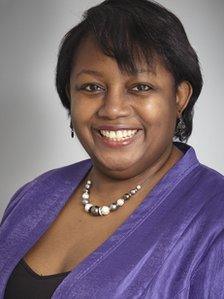Malorie Blackman Q&A: Meet the new Children's Laureate
- Published

Malorie Blackman is the bestselling author of the Noughts & Crosses series
Malorie Blackman, the author of the Noughts and Crosses teen novels, has been announced as the Waterstones Children's Laureate for 2013-2015.
Blackman is the author of more than 60 books for children and teenagers, including Pig-Heart Boy, Hacker, Cloud-Busting, and Thief!
Blackman, 51, who takes over from Gruffalo author Julia Donaldson, is the eighth writer to become laureate.
Here she tells BBC arts correspondent Tim Masters about her goals for the next two years and why she feels so passionately about writing for children.
What does it mean to you to be appointed Children's Laureate?
It's a tad daunting but exciting - I have a few ideas that I want to achieve over the two years but my overall aim is to get more children reading. It's a simple as that.
Why do you think it is important for parents and teachers to read with kids for 10 minutes a day?
I remember when I was at school we would have a 10-minute storytelling session where we'd all sit on the floor cross-legged and the teacher would read. It became something we all really looked forward to.
That was part of the reason I grew to love stories.
The other reason was my love of libraries. What I would like to do is make sure every primary school child has a library card so, where parents don't get their children library cards, we'll see if we can get schools to step in and make sure that every child has one.
It seems interesting to me in this country that libraries in prisons are mandatory, but libraries in schools are optional. I think that's a bit bizarre.
I really want to bang the drum for public libraries because we wouldn't be having this conversation now if it hadn't been for my local library.
We had a few non-fiction books at home, but my dad was of the opinion that fiction was a complete and utter waste of time because it wasn't real - so what was the point of reading it?
And so as a consequence, I lived down at my local library. I think he was absolutely wrong because I learnt more about people and relating and communicating with other people through fiction books than I ever did though non-fiction.
As a former computer programmer, what role do you think technology can play for young readers?
The first time I touched a computer was when I was 19 but it's part and parcel of their lives. It makes sense to use that in our strategies for getting more children reading more.
I would like to use stories as a springboard for children to make their own creative responses. I would like to encourage them to express themselves using music, art, film or whatever, and upload it to a website having been inspired by particular stories.
I was reading a study which said that 17% of young people would be embarrassed if their friend saw them reading. I feel that this is something that technology can tackle because technology is cool!
I'm very keen to promote reading online and in printed form.
I think we'll always have printed books, but the reality is that more and more children and adults are turning to reading in electronic form and we need to strike a good balance.
What advice have you had from previous laureates?
I have spoken to a few over the year, about how they found it and what has and hasn't worked.
One of the first pieces of advice I was given was, 'Make sure you book your holidays!'. The wonderful thing about the role is that every author or illustrator or poet can bring their own interests and passions to it.
What is your postbag like?
I do get a lot of letters and emails and I'm on Facebook and Twitter. I must admit my favourite sorts of letter are the ones where you have children and young adults saying they really didn't like reading and then they read one of my books and it really turned them onto reading.
I get letters on all topics. My Noughts and Crosses series is the one I get the most letters about. People have said they've been inspired by it, or it's made them think about things that they haven't thought about before - or that they've readjusted their thinking because of the book. That is such a compliment.
I certainly don't want to preach but my books are about asking questions and opening that debate - I don't pretend to have answers.
Will you have time to carry on writing as laureate?
Well I hope so but that said, I want make sure I do the job properly. I do hope that my writing doesn't fall by the wayside for two years but I'm planning to do both. It's about managing my time.
I want to talk to as many children and go into as many schools as possible and get out there and bang the drum for reading and stories.
The next book is scheduled for next spring so I've got to get on with it!
Which novel most inspired you as a child?
The Silver Chair by CS Lewis - because there's a part in that about believing in yourself even if no-one else does. That really spoke to me and I read that book about 15 times when I was a child.
- Published4 June 2013